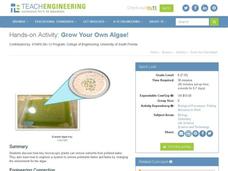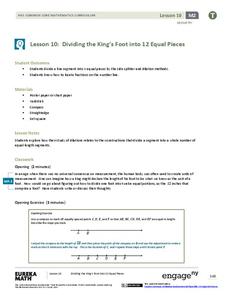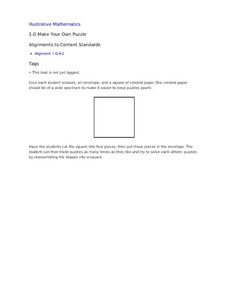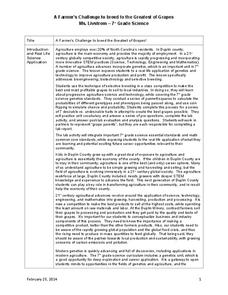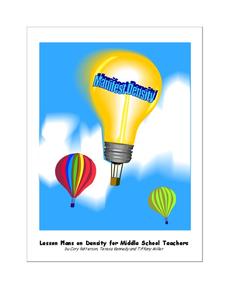Teach Engineering
Better By Design
Which modification is the best? Using the scientific method, pairs determine the effects of each control surface on the distance of a glider's flight. The activity, section 16 in a 22-part unit on aviation, allows pupils to gain a better...
Teach Engineering
Egg-cellent Landing
The classic egg-drop experiment gets a new bounce with an activity that asks pairs to design a lander similar to one used to land a rover on Mars within a fixed budget. The activity provides a great introduction to the idea of terminal...
Teach Engineering
Energy Systems
Is electricity created in the outlet? Using posters of several energy systems, collaborative groups identify and describe the parts of their systems. The groups also look at the environmental impacts of the systems and present their...
EngageNY
Differences Due to Random Assignment Alone
It takes a lot of planning to achieve a random result! Learners compare results of random assignment, and conclude that random assignment allows results to be attributed to chance. They also realize the set of random means are clustered...
Teach Engineering
Design and Build a Rube Goldberg
Let's see how complicated we can make this simple task. The last activity associated with a 10-part series has groups design and build a Rube Goldberg machine. Teams determine a simple task to accomplish and use the engineering design...
Teach Engineering
Bridge Types: Tensile and Compressive Forces
Bridges rely on tension and compression to keep them standing. Pairs test this principle by constructing simple bridges and applying a force to the center. Teams use the provided worksheet to record their observations of the reaction of...
Teach Engineering
What's Wrong with the Coordinates at the North Pole?
Here is an activity that merges technology with life skills as individuals use Google Earth to explore the differences between coordinate systems and map projections. The self-guided instructional activity is the fourth segment in a...
Teach Engineering
Density Column Lab - Part 1
Mass and density — aren't they the same thing? This activity has groups use balance beams and water displacement to measure several objects. The pupils use the measurements to calculate the density of the objects.
Teach Engineering
Building an Electromagnet
Your pupils can build their own electromagnet — awesome! The culminating activity in an eight-part series challenges groups to design and build their own electromagnet. The goal of the activity is to build a magnet capable of picking up...
Teach Engineering
Grow Your Own Algae!
Develop a model of a wastewater treatment center. The last activity of the unit has pupils mix a lake water sample into a tank of water containing fertilizers. Over time, the algae from the lake water grows and removes the nutrient-rich...
EngageNY
Dividing the King’s Foot into 12 Equal Pieces
Apply, apply, apply! A measurement lesson applies a number of concepts to help learn a new construction. Scholars learn to divide a segment into n equal parts using a method that uses the Side Splitter Theorem and a method that applies...
Teach Engineering
Efficiency of an Electromechanical System
How efficient is a motor in a LEGO set? Future engineers conduct an activity where a LEGO motor-generator system raises an object to a specified height. They then show what they learned and use their measurements to calculate the energy...
West Contra Costa Unified School District
Arcs and Angles
Noah didn't construct this kind of arc. High school scholars first explore how angles can be formed in circles. They then learn relationships between angles and arcs by conducting an exploratory activity where they position and draw arcs...
ConnectED
Crime Scene Investigation
How exactly does a crime scene investigation work? The resource, a unit on criminology, covers everything from the deductive reasoning skills needed for detectives to DNA fingerprinting, all the way to how to gather evidence and bring...
Illustrative Mathematics
Make Your Own Puzzle
Puzzling over what geometry activity to teach next? Look no further. This simple activity teaches young mathematicians how shapes can be decomposed into smaller figures, and how smaller figures can be assembled into larger shapes. To...
Kenan Fellows
A Farmer’s Challenge to Breed to the Greatest of Grapes
What does your class know about GMOs? Are they savvy to selective breeding? Challenge young minds to engineer the greatest crop of all time using a hands-on genetics unit. Learners discover the good and bad details of selective breeding,...
Curated OER
Volcanoes: Kindergarten Lesson Plans and Activities
In the pre-lab, kindergarteners mimic the movements of the eruption of a volcano and discover various volcanoes around the United States. Then, pupils sort different types of volcanic rocks in the lab before learning how volcanoes grow...
LABScI
Circulation and Respiration: Vital Signs
What do your vital signs tell your doctor? An engaging hands-on instructional activity has your learners monitor their own lung capacity, blood pressure, and heart rate. They then connect the vital measures to the workings of the...
Kenan Fellows
Farm to Fuel: The Alternative Fuels Industry
Need a activity to fuel young minds? A variety of hands-on activities is sure to get your class fired up! Beginning with an introductory slideshow and culminating with group presentations, the week-long unit has something for everyone....
Core Knowledge Foundation
Rocks & Minerals
Take young geologists on an exploration of the rock cycle with this six-lesson earth science unit on rocks and minerals. Through a series of discussions, demonstrations, and hands-on investigations your class will learn about the...
Voyage Solar System
Round and Round We Go — Exploring Orbits in the Solar System
Math and science come together in this cross-curricular astronomy lesson plan on planetary motion. Starting off with a hands-on activity that engages the class in exploring the geometry of circles and ellipses, this lesson plan then...
University of Southern Indiana
Manifest Density
There's a lot content packed into the four lessons of this physical science unit on density. From salad dressing to the water cycle and hot air balloons, these lessons engage students in hands-on activities that explore real-world...
Florida International University
The Good, the Bad and the Nasty Tasting
Examine the benefits of chemical defense mechanisms. Organisms in oceans use chemicals to ward off predators. Duplicate this adaptation using a hands-on experiment in which you ward off your predators (your pupils) with some bad-tasting...
Curated OER
Fractions Everyday
Students investigate fractions through interactive videos and hands-on activities and class made models.
Other popular searches
- Math Hands on Activities
- Hands on Activities in Math
- Math Hands on Activities
- Math Hands on Area Activities











